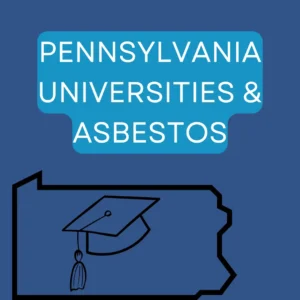In the realm of education and enlightenment, universities are supposed to be a haven for growth and development. However, beneath their hallowed halls and revered traditions, some Pennsylvania universities have harbored a hidden danger that continues to pose risks to students, faculty, and staff: asbestos. As we move into 2023, it is crucial to shed light on this issue, explore the potential consequences, and raise awareness about the urgent need for comprehensive asbestos management in these esteemed institutions.
Asbestos, a naturally occurring mineral once hailed for its fire-resistant properties, has been widely used in building materials for decades. It was extensively employed in construction projects across Pennsylvania, including universities, until its dangers became widely recognized. When asbestos-containing materials (ACMs) are disturbed or deteriorate over time, microscopic asbestos fibers can be released into the air, posing severe health risks.

Pennsylvania Universities Affected:
University of Pennsylvania (Philadelphia):
One of the oldest and most prestigious universities in the United States, the University of Pennsylvania has grappled with the presence of asbestos in several of its buildings. In 2021, the School of Dental Medicine’s Evans Building underwent asbestos abatement due to the discovery of ACMs during a routine inspection. This incident underscores the potential risks students and faculty face unknowingly on a daily basis.
Carnegie Mellon University (Pittsburgh):
Known for its world-class research programs and innovative curriculum, Carnegie Mellon University has not escaped the specter of asbestos. In 2022, the demolition of a former campus building, Porter Hall, required specialized asbestos removal due to its presence in the structure. This case highlights the importance of proactive asbestos management during renovation and demolition activities.
Temple University (Philadelphia):
Temple University, a prominent educational institution in Philadelphia, has also had its share of asbestos-related challenges. In 2023, an inspection revealed the presence of ACMs in the Science Education and Research Center, necessitating immediate remediation efforts. This incident underscores the pressing need for universities to prioritize regular inspections and take swift action when asbestos is discovered.
Consequences and Health Risks:
The inhalation of asbestos fibers can lead to severe health complications, including lung cancer, mesothelioma, and asbestosis. These diseases may not manifest for decades after exposure, making early detection and prevention imperative. Students, faculty, and staff within Pennsylvania universities may be unknowingly exposed to these risks, jeopardizing their long-term well-being.
Conclusion:
Asbestos remains a silent threat, but by acknowledging its presence, taking proactive steps to manage it, and fostering awareness, universities can build a safer, healthier future for all.

Written By Jeff Nelson
Sources:
http://www.mountholyokenews.com/news/2017/3/30/asbestos-in-porter-forces-students-to-relocate
Don’t Wait—Contact an Experienced Pennsylvania Mesothelioma Attorney Today!
Now that you know the mesothelioma statute of limitations in Pennsylvania, contact an experienced attorney from our firm to represent your case before time runs out.
At Halpern Law Firm, we help clients throughout Pennsylvania, with offices in Philadelphia, Pittsburgh, Allentown, Scranton and Johnstown. Call us today for a free consultation at (800) 505-6000.
